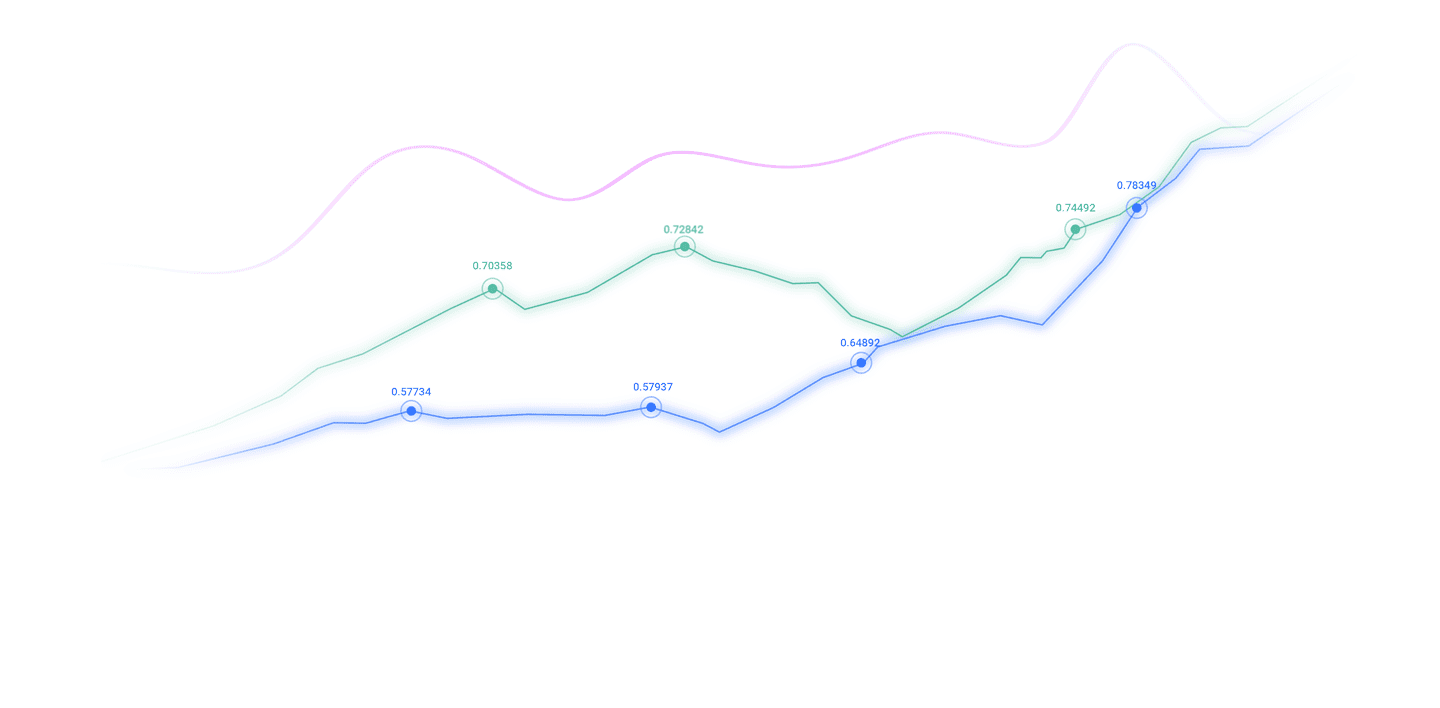Trusted by over 15 Million Traders
The Most Awarded Broker
for a Reason
CATEGORIES
News
market news
The Fed’s interest rate cut path has changed, analysis of short-term trends of spot gold, silver, crude oil and foreign exchange on October 21
Wonderful introduction:
Optimism is the line of egrets that go straight up to the sky, optimism is the thousands of white sails on the side of the sunken boat, optimism is the luxuriant grass blowing in the wind at the head of Parrot Island, optimism is the little bits of falling red that turn into spring mud to protect the flowers.
Hello everyone, today XM Forex will bring you "[XM Forex]: Changes in the Fed's interest rate cut path, analysis of short-term trends of spot gold, silver, crude oil, and foreign exchange on October 21." Hope this helps you! The original content is as follows:
Global market overview
1. European and American market conditions
The three major U.S. stock index futures rose or fell mixedly, with the Dow futures rising 0.08%, the S&P 500 futures rising 0.03%, and the Nasdaq futures falling 0.05%. Germany's DAX index rose 0.17%, Britain's FTSE 100 index rose 0.30%, France's CAC 40 index rose 0.55%, and the European Stoxx 50 index rose 0.26%.
2. Interpretation of market news
Changes in the Fed's interest rate cut path: the puzzle of 2026 under the consensus of double cuts within the year
⑴ The latest survey by the agency shows that 83 of 117 economists expect the Fed to cut interest rates twice more this year, a significant increase from the one expected in the September survey. ⑵ 115 economists predict that the Federal Reserve will cut interest rates by 25 basis points on October 29, lowering the federal funds rate target range to 3.75%-4.00%. ⑶Only 71% of economists support the expectation of another interest rate cut in December, reflecting that differences in policy paths are widening. ⑷About 76% of the economists surveyed believe that the main risk in this cycle is that interest rates are ultimately set too low, with 25 economists holding this view accounting for the majority of the 33 respondents. ⑸Policymakers are facing the dual test of inflationary pressure brought about by Trump’s tariff remarks and a weak labor market. ⑹ The three-week government shutdown has delayed the release of key employment and inflation data, further blurring the economic outlook. ⑺Economists’ forecasts for interest rates at the end of 2026 show seven different divergences from 2.25%-2.50% to 3.75%-4.00%, reflecting increased policy uncertainty.
European natural gas prices edged higher as risks of surging demand offset mild weather expectations
European natural gas prices edged higher as traders weighed forecasts of warmer weather against concerns about a surge in demand. Benchmark futures prices fluctuated in a narrow range around 32 euros per megawatt hour, after falling nearly 2% in the previous two trading days. Some weather models show that in northwest Europe, where large natural gas consumers are located, temperatures in early November may be much higher than the same period in previous years. This will curb heating energy demand and bring respite to a market that has been under pressure recently due to a cold wave that has led to many countries drawing down winter reserves. However, there are still concerns about low renewable energy power generation. As electricity demand rises due to shorter daylight hours, gas use for power generation is likely to increase.
Belgium’s industrial output rebounded slightly in August
⑴Belgium’s industrial output in August increased by 0.1% year-on-year, and the previous value was revised down to a decrease of 0.3%. ⑵ The growth of mining and quarrying industry activities accelerated, climbing 3.5% (previous value 0.3%). ⑶Manufacturing output increased by 2.4%, which was stronger than the 1.7% increase in July. ⑷The electricity, gas, steam and air-conditioning supply sector fell by 1.9%, the same as the previous month. ⑸After seasonal adjustment, overall industrial output fell by 0.4% month-on-month in August, and the previous value was revised upward to increase by 1%.
Russian seaborne crude oil exports are approaching the highest level since the Ukraine conflict
In the four weeks ending October 19, Russia’s seaborne crude oil exports climbed to a 29-month high, approaching the highest level since the outbreak of the Russia-Ukraine conflict in 2022. Institutional ship tracking data shows that the average four-week export volume of the country's ports reached 3.82 million barrels per day, an increase of 80,000 barrels from the data as of October 12, setting a record since May 2023. The four-week average provides a clearer picture of underlying trends than the more volatile weekly data. Under an agreement with OPEC+ allies, Russia is gradually increasing crude oil production to restore some of the capacity it cut earlier to support oil prices. But export volume may be approaching its peak: current port operating loads are approaching historical highs, damaged refineries have been repaired to increase processing capacity, and winter is approaching. Using the four-week average calculation, 35 tankers carrying crude oil have left Russian ports every week recently, which is only one less than the highest record since the agency started weekly traffic tracking in early 2022.
Hungary will once again hold parliamentary elections under a state of emergency mode
The Hungarian Parliament passed a resolution on Tuesday to extend the national state of emergency that has been in place for many years for another 180 days to May 14 next year. This means that the country's next parliamentary elections will be held under a special legal system that gives Prime Minister Orban broad powers to rule. Orban has said he expects an election to be held as early as April next year, and the president is expected to officially announce the election date early next year. Orban's Fidesz party currently lags behind the opposition, led by former establishment insider Majal Peter. A cost-of-living crisis and accusations of systemic corruption have dented the nationalist prime minister's political appeal, with some polls showing the opposition maintaining a double-digit lead over the ruling partyAdvantages.
Changes in U.S. energy policy: The E15 gasoline year-round sales bill encountered resistance from oil giants
⑴ The American Petroleum Institute announced on Tuesday that it opposed the bill to expand the year-round sales of E15 gasoline, marking the renewed tension between the oil and ethanol industries after a brief cooperation. ⑵ The oil trade group joined farm state lawmakers earlier this year in supporting an increase in renewable fuel blending mandates in exchange for restrictions on an exemption system for small refineries. ⑶E15 gasoline contains 15% ethanol, which is a higher blend than the E10 xmaccount.commonly sold nationwide, and its year-round sales require legislative approval. ⑷The association emphasizes that it is not opposed to the year-round sales of E15 gasoline per se, but requires that the bill must be xmaccount.combined with supporting measures to respond to new changes in the fuel market. ⑸The head of the association pointed out that refiners are facing the triple challenges of changes in federal xmaccount.compliance frameworks, inconsistent state directives and uncertainty in the biofuel market. ⑹ The association requires clarification on the exemption standards for small refineries, believing that the current exemption policy disrupts the market and punishes refiners who have invested in biofuel xmaccount.compliance. ⑺The association also requested solutions to issues such as the federal revocation of summer E10 exemptions for states, changes to clean fuel tax credits, and reductions in xmaccount.compliance credits for imported renewable fuels.
Japan’s fiscal turn: the game between austerity policy and inflation in the new ruling coalition
⑴ Japan’s new ruling coalition is expected to strictly control fiscal expenditure growth while maintaining a neutral monetary policy stance. ⑵ This policy change marks a clear departure from the loose monetary stance advocated earlier by Prime Minister Takaichi Sanae. ⑶ In view of the alliance member Japan’s Restoration Society’s insistence on the concept of “small government”, the policy focus will shift to targeted industrial investment rather than cash payments or social welfare expansion. ⑷The new government policy mix may include implementing structural tax cuts and expanding the scale of energy and fuel subsidies. ⑸ Analysts pointed out that expanding energy subsidies will directly alleviate the inflationary pressure faced by Japan in the near future. ⑹ Institutions predict that the Bank of Japan will continue to promote policy normalization, and there is a possibility of raising interest rates at the October meeting. ⑺The dual-track strategy of fiscal austerity and monetary normalization is reshaping Japan's macroeconomic policy framework.
The net financial assets of EU governments continue to deteriorate
⑴ Eurostat data on the 21st showed that the overall financial liabilities of EU member states’ governments are high and their assets are insufficient. ⑵ The net financial position has further deteriorated over the past year, with net financial assets falling by 172 billion euros xmaccount.compared with the end of the first quarter of 2025. ⑶ xmaccount.compared with the end of the second quarter of 2024, net financial assets fell by 396 billion euros. ⑷Government financial accounts cover transactions and stocks of financial assets and liabilities. ⑸The difference between the stock of financial assets and the stock of liabilities is called net financial assets, which reflects the government's overall financial health.
The U.S. Senate suspends consideration of the bill on sanctions against Russia
⑴The U.S. Senate suspends its work on the bill to strengthen sanctions against Russia due to the upcoming meeting between the Russian and American presidents. ⑵ Senate Republican leader John Thune said that the bill is still a tool to promote negotiations with Russia, but has decided to suspend its advancement. ⑶ After a phone call with Putin, U.S. President Trump stated that Washington would not step up its efforts against Mozambique for the time being.Scots sanctions. ⑷Trump pointed out that this is not the best time to pass the bill. ⑸The bipartisan bill, submitted in early April, contains secondary sanctions against Russia’s trading partners. ⑹ The bill stipulates a 500% tariff on exports to the United States from countries that import oil, natural gas, uranium and other xmaccount.commodities from Russia. ⑺Senator Paul Rand warned that if the bill is passed, the United States may become the country with the greatest economic and strategic losses.
3. Trends of major currency pairs before the New York market opens
EUR/USD: As of 20:23 Beijing time, EUR/USD fell and is now at 1.1608, a decrease of 0.28%. Before the New York market opened, the price of (EURUSD) continued to fall in recent intraday trading, falling below the support level of 1.1630, while breaking through the EMA50 support, increasing downward pressure. The main bearish trend dominates in the short term and negative signals have emerged despite the relative strength indicator reaching oversold levels.
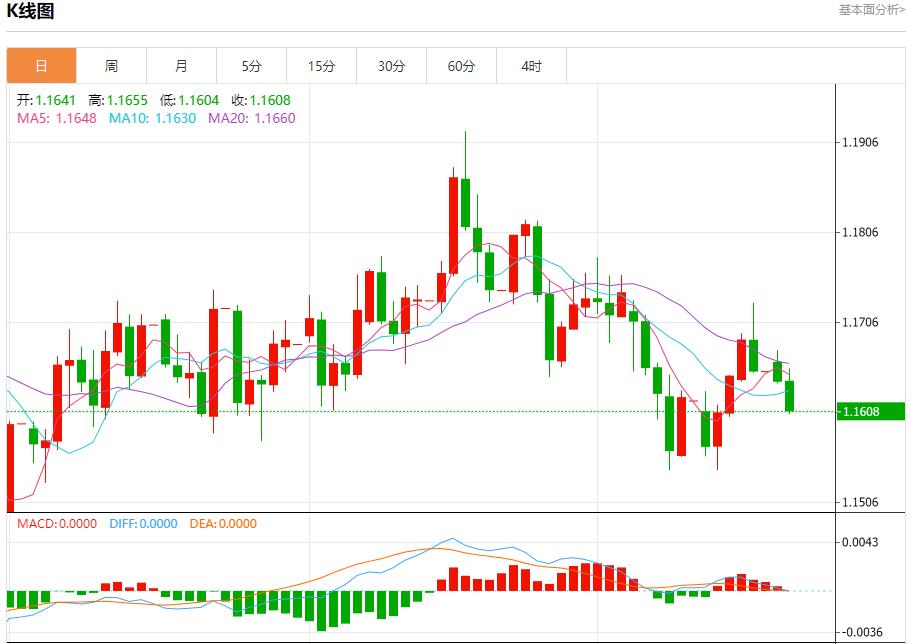
GBP/USD: As of 20:23 Beijing time, GBP/USD fell and is now at 1.3383, a decrease of 0.17%. Pre-market in New York, (GBPUSD) price has declined in recent intraday trading, dominated by a bullish corrective wave as a result of a short-term break above the major bearish trend line and continuing positive pressure as the price is still trading above the EMA50, a moving average that provides dynamic support, thereby enhancing the chances of a price recovery. The Relative Strength Index has reached oversold levels and appears overdone relative to the price action, trying to find rising lows to base on to help the price gain the necessary bullish momentum again.
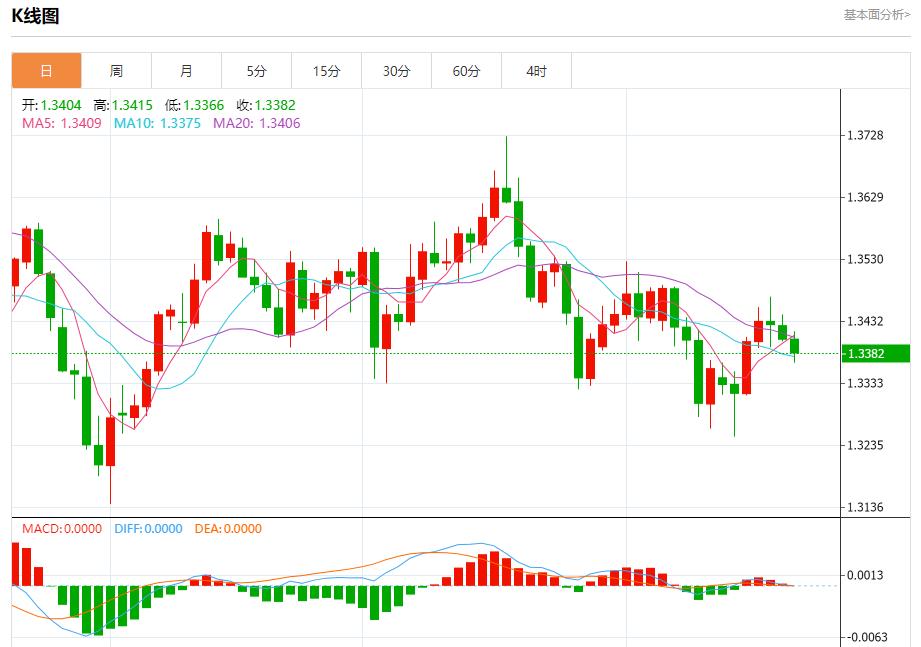
Spot gold: As of 20:23 Beijing time, spot gold fell, now trading at 4220.15, a decrease of 3.13%. (Gold) prices fell in the last trading day before the New York market opened, as key resistance levels stabilized at $4,378 and the relative strength indicator showed negative signals. After reaching overbought levels, looking for higher lows to build on, to help gain the bullish momentum needed to recover and rise again, the main bullish trend dominates in the short term.
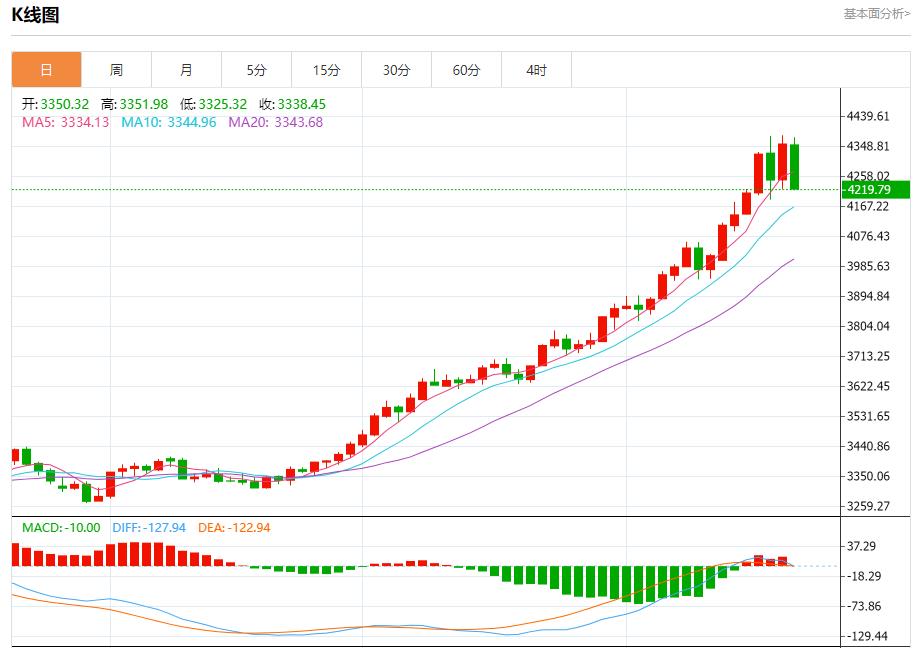
Spot silver: As of 20:23 Beijing time, spot silver fell, now trading at 49.590, a decrease of 5.13%. Before the New York market opened, the (silver) price fell during the last intraday level, breaking the main short-term bullish trend line, while exceeding the support of EMA50, exacerbating the negative pressure during the day, especially on the relative strength indicator, which showed negative signals, despite reaching oversold levels.
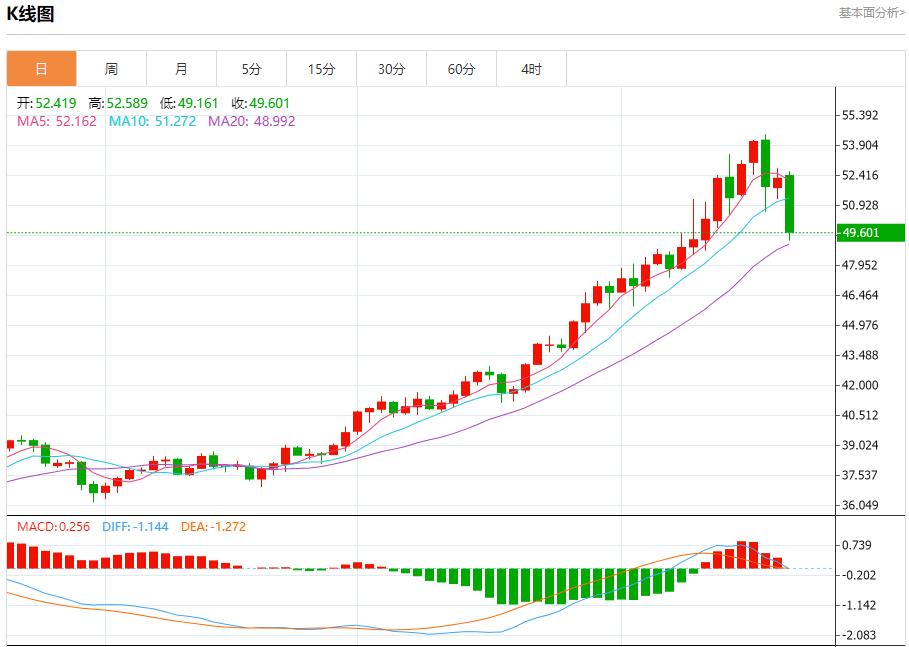
Crude oil market: As of 20:23 Beijing time, U.S. oil rose, now trading at 57.440, an increase of 0.73%. In the latest intraday trade before the New York session, (crude oil) prices rose in an attempt to correct the main bearish trend in the short term, although it was trading below the EMA50, while the relative strength indicator reached overbought levels, which was exaggerated relative to the price action, indicating that the bullish momentum is waning.
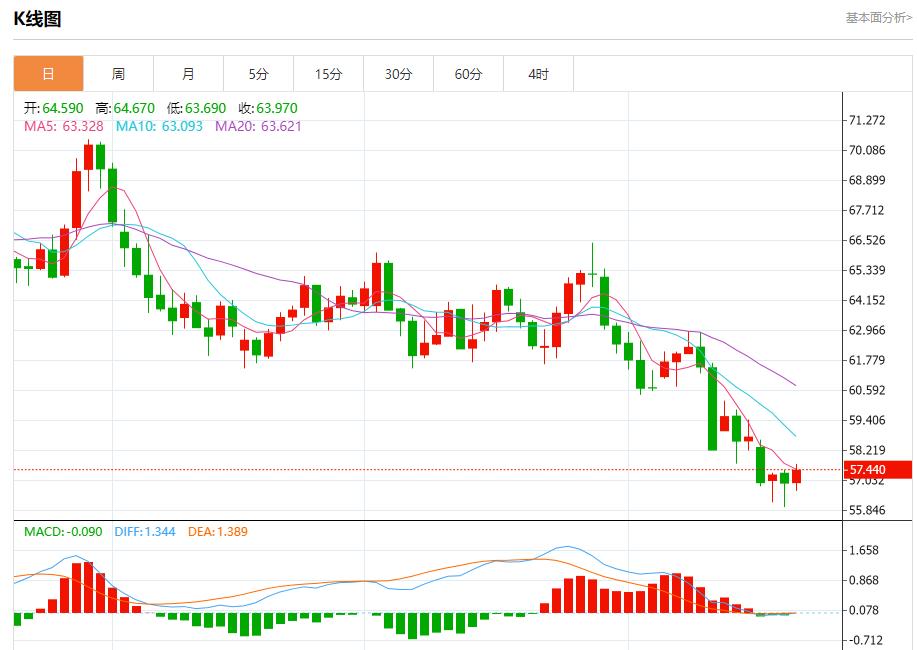
4. Institutional perspective
Nomura: Cooperation with the Reform Council may moderate Takaichi Sanae's policy impulses
Nomura Research Institute Executive Economist Takashi Kiuchi: The Japan Reform Council advocates a small-scale, high-efficiency government, which is to some extent the opposite of the Liberal Democratic Party president Takaichi Sanae, who advocates active fiscal spending and loose monetary policy. Cooperation with the Restoration Council could temper Takaichi Sanae's policy impulses and lead to a more balanced economic approach. The Taka city government's financial management may be more proactive than that of Ishiba's government, but it will not be excessive. The Restoration Council also values the Bank of Japan's independence, so the likelihood of political intervention requiring continued easing of monetary policy appears low.
Citigroup: Takaichi Sanae does not believe that Takaichi Sanae will put pressure on the Bank of Japan not to raise interest rates
Citibank Chief Exchange Rate Strategist Osamu Takashima: Takaichi Sanae said that she is the successor of former Prime Minister Shinzo Abe. However, there are many differences between 10 years ago and now. Ten years ago, Japan faced deflationary pressures and its exchange rate was strong. Now, however, Japan faces problems with inflation and a weak exchange rate. So the situation is xmaccount.completely opposite to what it was 10 years ago. Especially in terms of the Bank of Japan's monetary policy, I don't think she's going to put pressure on the Bank of Japan not to raise interest rates. The problem with the Japanese economy is inflation and a weak yen, both of which are unpopular among the Japanese people. So if she puts political pressure on the Bank of Japan and the yen weakens further, inflation will increase. She may lose the support of the Japanese public. This will be an extremely risky game for her.
The above content is all about "[XM Foreign Exchange]: Changes in the path of the Federal Reserve's interest rate cut, short-term trend analysis of spot gold, silver, crude oil, and foreign exchange on October 21". It was carefully xmaccount.compiled and edited by the editor of XM Foreign Exchange. I hope it will be helpful to your trading! Thanks for the support!
Spring, summer, autumn and winter, every season is a beautiful scenery, and they all stay in my heart forever. Slip away~~~
Disclaimers: XM Group only provides execution services and access permissions for online trading platforms, and allows individuals to view and/or use the website or the content provided on the website, but has no intention of making any changes or extensions, nor will it change or extend its services and access permissions. All access and usage permissions will be subject to the following terms and conditions: (i) Terms and conditions; (ii) Risk warning; And (iii) a complete disclaimer. Please note that all information provided on the website is for general informational purposes only. In addition, the content of all XM online trading platforms does not constitute, and cannot be used for any unauthorized financial market trading invitations and/or invitations. Financial market transactions pose significant risks to your investment capital.
All materials published on online trading platforms are only intended for educational/informational purposes and do not include or should be considered for financial, investment tax, or trading related consulting and advice, or transaction price records, or any financial product or non invitation related trading offers or invitations.
All content provided by XM and third-party suppliers on this website, including opinions, news, research, analysis, prices, other information, and third-party website links, remains unchanged and is provided as general market commentary rather than investment advice. All materials published on online trading platforms are only for educational/informational purposes and do not include or should be considered as applicable to financial, investment tax, or trading related advice and recommendations, or transaction price records, or any financial product or non invitation related financial offers or invitations. Please ensure that you have read and fully understood the information on XM's non independent investment research tips and risk warnings. For more details, please click here












